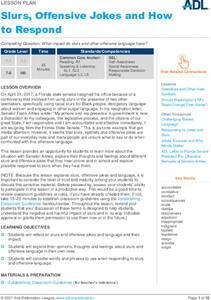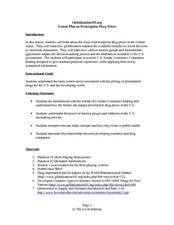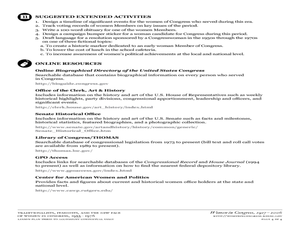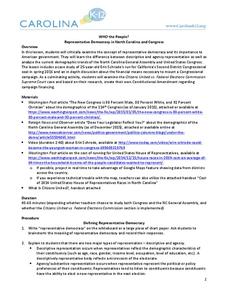US House of Representatives
Congresswomen in an Age of National Crises, 1935–1954
Class members investigate congresswomen and the role these senators and representatives played in congress during the period from 1935–1954.
US House of Representatives
A Picture Is Worth a Thousand Words
As part of a study of women in Congress, groups analyze historical photographs associated with women's history and with women senators and representatives.
Anti-Defamation League
Slurs, Offensive Jokes and How to Respond
How to respond to slurs and offensive jokes is the topic of a lesson designed for middle and high schoolers. After journaling about their experiences with slurs and nasty jokes, participants read an article about a Florida State Senator...
National Woman's History Museum
Women, Education, Sports, and Title IX
Title IX did more than change the face of sports in the United States. This landmark legislation also impacted women in education and politics. High schoolers examine the text of the legislation and the 2016 Senate resolution and watch...
Curated OER
Redistricting: Drawing the Lines
Difficult redistricting concepts are covered in a context that will make it understandable to your government scholars. They begin with a KWL on the term redistricting and then watch a video to answer some questions. They analyze...
C-SPAN
How A Bill Becomes A Law
Seven steps are required for a bill to become a United States law. The Families First Coronavirus Response Act (H.R. 6201) is used as a model for the process of how a bill becomes a law. Class members work independently through a Google...
National Endowment for the Humanities
Soviet Espionage in America
The war against Communism and Joseph McCarthy’s place in it are the focus of a series of three lessons examining postwar America from 1945-1950. This first activity asks groups to read an introduction that describes the Verona Project...
Curated OER
All Talk, No Action
Students act as senators to negotiate a compromise on judicial filibusters. For homework, they write letters to their senators analyzing the filibuster debate and making recommendations for the future.
Curated OER
Whitewashing History
Students revisit issues of civil rights in the U.S. They use the recent national discussion of retiring Senator Strom Thurmond's 1948 Dixiecrat Presidential campaign as a starting point.
Curated OER
Lura Pierce
Students express opinions on eavesdropping on citizens, read the article "GOP Senators sat Accord is Set on Wiretapping", and debate issues presented in the article. They create letters to send to Congress presenting their concerns.
Curated OER
Globalization: Prescription Drug Prices
Young scholars take a closer look at prescription drug prices in the United States and around the world. In this global issues lesson, students investigate health care costs, consider the impact of global prescription agreements, and...
Curated OER
A Changing of the Guard: Traditionalists, Feminists, and the New Face of Women in Congress
Young scholars explore the role of women as Congressional leaders. In this women's rights instructional activity, students identify and investigate the impact of women representatives and senators in the U.S. Legislative Branch....
Curated OER
We Were Here First
Young scholars explore the legal and historical experience of native peoples living in the United States. They write a letter to their United States senator commenting on the Hawaiian bill using information gathered during their research.
Curated OER
Immigration Reform: Understanding the Issue From Different Points of View
High schoolers examine the topic of immigration reform. They conduct research on groups representing various viewpoints on immigration, write and perform a role-play, and write a persuasive essay or letter to a state senator on their...
Curated OER
A Tale of Two Wars
Students create Venn diagrams comparing and contrasting the Vietnam and Iraq wars. They write informed letters to their senators expressing their opinions and possible solutions to the war. They also create mock bumper stickers...
Center for Civic Education
Historical Analysis of Constitutional Amendments
Each of the 27 Amendments to the U.S. Constitution were adopted within specific economic, political, social or cultural, and international contexts. As part of their Constitution Day/Week studies, seniors investigate these factors for...
US House of Representatives
Women Pioneers on Capital Hill, 1917–1934
As part of a study of the women elected to Congress from 1917 to 1934, groups research and then design a museum exhibit that describes the life and the congressional service of one of these women.
Carolina K-12
Who the People? Representative Democracy in North Carolina and Congress
Our elected officials are supposed to represent us, but what does it mean when they aren't like us? Budding citizens explore the demographic makeup of the US Congress, the role of money in political elections, and the Citizens United...
iCivics
Mini-Lesson: Presidential Appointments
Can the president of the United States hire anyone he or she wants for any position in the executive branch? The answer may surprise scholars! After investigating the appointment process, historians, by themselves or in pairs, analyze...
US House of Representatives
The Women of Congress Speak Their Mind
A picture may be worth a thousand words, but words can tell many stories. To conclude their study of the women who have served in the US Congress until 2006, groups analyze statements made by these remarkable women.
iCivics
Mini-Lesson: Midterm Elections
Find out the differences between presidential and midterm elections with an informative resource. Pupils discuss the importance of midterms to the presidency and how midterms affect the balance of government branches. They also fill out...
US House of Representatives
Exclusion and Empire, 1898–1941
Often forgotten and written off as the model minority, Americans with heritage in Asia and the Pacific Islands have played an essential role in American history, including Congress. Budding historians reclaim history by researching the...
US House of Representatives
From Exclusion to Inclusion, 1941–1992
The legacy of Japanese American internment impacted America for decades, including Congress. Class members consider the tenure of Asian American representatives in Congress and how the legacy of World War II affected their service. Other...
US House of Representatives
Hispanic Congressional Representation in the Era of U.S. Continental Expansion, 1822–1898
From the Louisiana Purchase to the Spanish-American War, the history of the United States is intertwined with the story of Hispanic Americans. Using an article about Hispanics in Congress during the 1800s, learners research their lives...

























